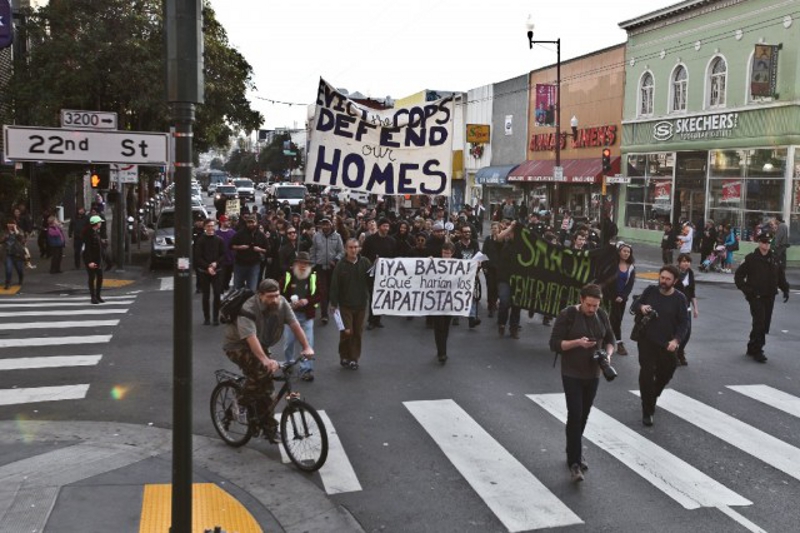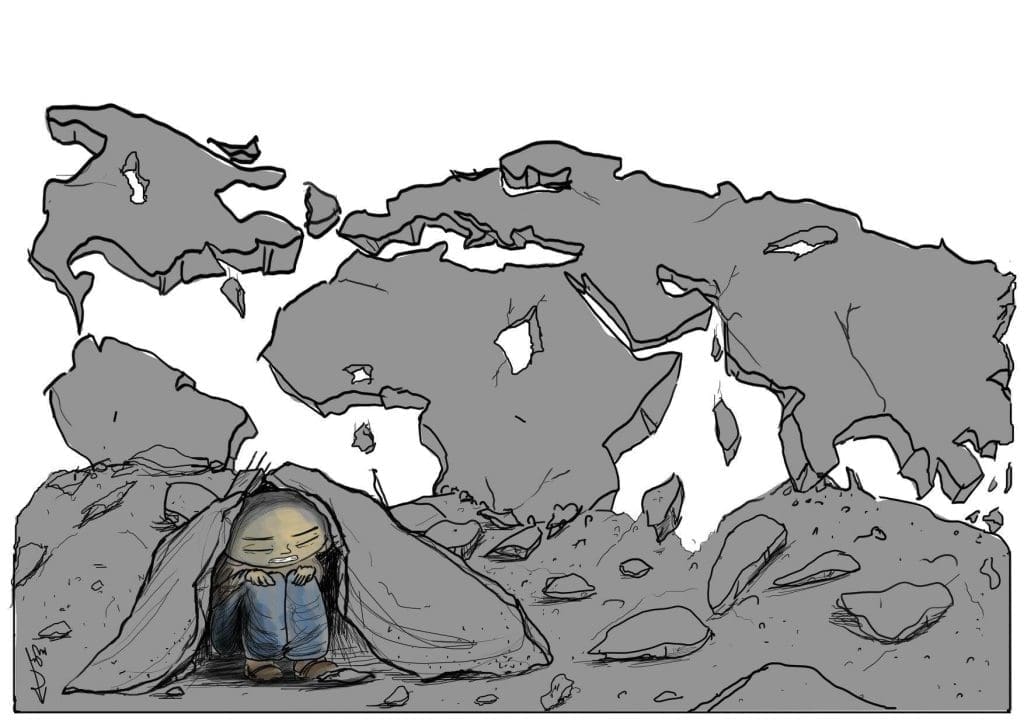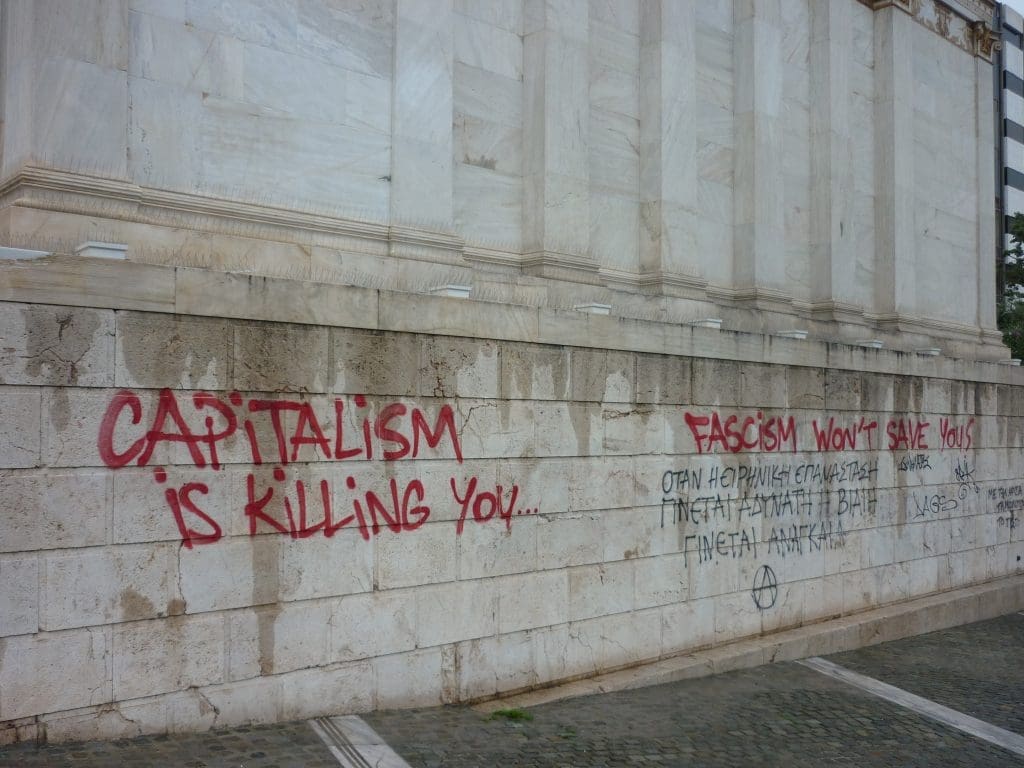Transcribed from the 18 January 2014 episode of This is Hell! Radio (Chicago) and printed with permission. Archived audio to be made available online eventually.
I think there’s a very specific idea of artistic success that’s being pushed that’s tied to the ability to live in these cultural capitals, places like New York or San Francisco. People who can’t go to those places think that they’re not allowed to participate.

 Chuck Mertz: On the line with us right now is Sarah Kendzior. She is a St. Louis based columnist for Al Jazeera English and The Chronicle of Higher Education. Her April 2013 article The Wrong Kind of Caucasian is the most popular Al Jazeera English op-ed of all time. That story explains how, despite the Boston bombers having little to do with Chechnya, the media were quick to demonize an entire ethnicity. Sarah’s most recent writing at Al Jazeera is “Expensive Cities are Killing Creativity: New York City, a traditional incubator for artists, has now become a gated citadel for creativity.” Good morning, Sarah.
Chuck Mertz: On the line with us right now is Sarah Kendzior. She is a St. Louis based columnist for Al Jazeera English and The Chronicle of Higher Education. Her April 2013 article The Wrong Kind of Caucasian is the most popular Al Jazeera English op-ed of all time. That story explains how, despite the Boston bombers having little to do with Chechnya, the media were quick to demonize an entire ethnicity. Sarah’s most recent writing at Al Jazeera is “Expensive Cities are Killing Creativity: New York City, a traditional incubator for artists, has now become a gated citadel for creativity.” Good morning, Sarah.
Sarah Kendzior: Hi.
CM: In your article at Al Jazeera, you write about how musician Patti Smith was asked what advice she had for young people trying to make it in New York City. The long-time New Yorker’s take: Get out. Patti Smith said, “New York has closed itself off to the young and the struggling. New York City has been taken away from you.” In October, musician David Byrne argued that the cultural part of the city, the mind, has been usurped by the top 1%. “Under Michael Bloomberg,” you write, “New York’s first billionaire mayor, homelessness and rent both soared, making one of the world’s centers of creative and intellectual life unlivable for all but the richest.”
I’ve seen this play out on a small scale through gentrification since the 1990s, everywhere from San Francisco to Chicago to New York: artists move into a neighborhood that was low-rent, they can have the necessary space to pursue their beginning or struggling careers. They make the neighborhood hip, attracting creative people and those who love art, which leads to developers and investment and more money, and higher-end stores, and rents and chains and malls. That artsiness then becomes a branding image for the local Chamber of Commerce. So with gentrification going on for so long, what makes what has happened to New York uniquely important?
SK: Well I think some of it is the scale. I mean, there’s gentrification in smaller cities, but I don’t think anything quite touches New York or San Francisco in terms of the dominance of millionaires and billionaires establishing the norms of cultural life.
One thing that’s happened all across the country is the rise of unpaid labor as the entryway into creative and intellectual professions, where young people are expected to work for free, and to have the financial means to support themselves when they begin working in fields like art, journalism, entertainment, or even policy. So these fields become dominated and run by people from wealthy backgrounds. The art world is directed by the purchases of people who work on Wall Street. So it all becomes removed from the idea of creativity as something that everybody can participate in.
CM: When we had guests on, in the late ‘90s, who were critical of gentrification (people like Rebecca Solnit who wrote Hollow City about San Francisco), they warned us about what this would mean. People who live in neighborhoods for years, community activists who work hard to make the neighborhood better, get priced out, forced out into another neighborhood where they face the same problems they faced in the last place.
But the neighborhoods that they left, they “get better.” Are we overreacting to something that’s good for neighborhoods? Everybody tells us gentrification is fantastic. Look at this old neighborhood that’s kind of run-down, it has these hip stores but it’s kind of shady, kind of iffy, but now after gentrification, look how clean it is, look at the streetscaping. Are we overreacting to gentrification?
SK: No, I don’t think we are. Because all the arguments you just described focus on the landscape, the look of the place, and the commercial products that are available. They don’t focus on the people who live there—the people who lived there, I should say—because most of those people are forced out.
That’s what happened in New York City. If you look at a map of income levels in different parts of the city, Manhattan is sky-high and the further out you go, the lower the average income is. And a large portion of the city is living in poverty. There are homeless people who are working two jobs. That’s a result of gentrification. It’s pushed up rent, and also started to eliminate lower-skilled jobs. And for the lower-skilled jobs that remain, the wages remain stagnant. So it’s completely impossible for people to stay in the neighborhoods that they grew up in. That’s a huge problem.
I’m for revitalization. I’m in St. Louis, which is undergoing a lot of revitalization, and has a large amount of empty run-down places that people are trying to reincorporate into functional neighborhoods. But it’s for the people who live here. It’s to improve the quality of life for people who have had to bear the burdens of failed urbanization projects and failed social policies. It makes their everyday lives more pleasant, more bearable.
CM: You write how David Byrne argues that, “at play was more than the cost of living, it was a shift in the perceived value of creativity, backed by an assumption that it must derive from—and be tied to—wealth.” Byrne also says, “a culture of arrogance, hubris, and winner-take-all was established. It wasn’t cool to be poor or struggling. The bully was celebrated and cheered.” Do you believe this is the ‘new normal’ for American culture, due to both gentrification and the growing disparity in earnings and wealth? Will inner cities, the downtown areas and cultural centers of major cities, be taken over by the 1%?
SK: Yeah. It’s interesting, the use of the phrase, ‘new normal,’ because I don’t think this is normal. I think we’ve come to accept it as normal and inevitable, whereas it’s really a product of purposeful policy changes and changes in attitude. And this is not new. This has been going on for the last 30 years.
I think the problem is that people do view it as inevitable—especially, as Byrne says, the bullying, callous attitude that people have towards the worse-off. The people who are winning in this economy are supposedly winning because they “deserve it,” and especially in the last five years it’s become painfully obvious that this is not the case. The people winning in this economy are often incompetent and profiting off of the suffering of other people.
People have come to realize that now; that’s not really a radical thing to say anymore. But people don’t know what to do about it. So that’s the impasse that we’re at, where people recognize the broad structural problem, and they’re upset about it, but they feel helpless. And so a lot of these smaller more local initiatives are people trying to get that power back. They know they can’t really do it on a national scale, so they’re focusing on what they can do. And I think that’s a good place to begin.
CM: You write, “New York and San Francisco, London, Paris, and other cities where cost of living has skyrocketed, are no longer places where you go to ‘be someone.’ They are places you live when you are born having arrived.” But what happens to culture and society when the centers of culture become dominated by the wealthy?
SK: You see a lack of genuine innovation and experimentation. Of course in San Francisco you see a lot of innovation in the tech sector, but it’s very specific, it’s rooted in Silicon Valley, and it’s performed by a certain type of person. You lose the broader artistic community and one of the tragedies of this situation is that we don’t know what people could have been doing if they had not been pushed out.
I think there’s a very specific idea of artistic success that’s being pushed that’s tied to the ability to live in these cultural capitals, places like New York or San Francisco. People who can’t go to those places think that, therefore, “I’m not allowed to participate. I have no validity because my validity needs to come from institutional affiliations, and all the institutions are located in this place.”
Sometimes I get emails from young writers, and they say, “I want to be a writer like you, but I can’t afford to move to Brooklyn, and I don’t think it’s something I could ever do.” I always say, write about where you are now. There are stories all around you; you’ve been trained not to notice them. Open your eyes and take advantage of what you already have. You don’t need to be artistic or creative or intellectual in some specific way. This isn’t something that people own. This is a process that can take place anywhere. In this article I tried to divorce the idea that success is dependent on wealth or defined by people who have wealth.
CM: That reminds me, recently I was interviewing Gordon Young, who’s got a book out about Flint, Michigan, called Teardown. And he told me that when he was a kid in early ‘80s Flint, he was really into the Manchester scene in England. He was really into the Smiths, Joy Division, New Order. He saw this romantic thing in Manchester, this post-industrial hell-place, he really over-romanticized it, and he didn’t realize until he moved out of Flint maybe five years later that he was living in the American version of Manchester. He never realized that this is the exact same thing that he was romanticizing about the other place.
You make a really great point: you don’t have to go to New York to become an amazing writer. If you’re somebody who doesn’t have a lot of money, you can be a great writer like Sarah is, from St. Louis, or you can be a great writer from Detroit or Cleveland or wherever.
You write, “creativity as an expression of originality, experimentation and innovation is not a viable product. It has been priced out into irrelevance, both by the professionalization of the industries that claim it, and the soaring costs of entry in those professions.” But don’t we have more access than ever into the creativity market? After all, I do this radio show that’s podcast around the world, and even if I didn’t have this station, I could podcast free of the shackles of NPR or corporate radio. Writers can produce their stuff online and make it accessible to anyone, just like artists can. So while the industries that claim creativity have closed access, the Internet has opened access. Hasn’t it balanced out? Except for the fact that nobody’s making money except the industry?
SK: That last thing you mentioned is kind of a big deal. I absolutely agree with you that the internet has given people opportunities to build their own platforms, build their own audiences, share their ideas, and that’s great. But I think it’s very interesting that at the exact moment that this happened, when anybody could have a voice, creative industries raised barriers in order to keep people out.
I saw an ad the other day for an internship at the magazine The Economist, where if you wanted to apply, you had to be willing to fly—on your own dime—to New York or London to do the interview, and then take a 3-month internship, wherever they tell you, that would be unpaid. And this is a standard model: that you need to have thousands and thousands of dollars at your behest to pursue jobs at whim.
This is not how it used to be. Creative industries and industries like journalism never paid well, but they usually paid something. It was understood that this was work, and that this work would be compensated. Now that idea is out the window, and people who want compensation for their creative efforts are told they’re being entitled. There are entire platforms that profit off of this model, like the Huffington Post, which tells people, “you publish here, you’re going to get exposure, you’re going to get attention, it’s going to be worth it.” But what happens is that only people who don’t need money are able to live like this.
You do have people using the internet as an outlet for expression, but you have others who aren’t, because they have to work to make a living, and that takes a lot of time, particularly if you have a family. So those people are being driven out of this market. And because it’s a situation where people leave quietly, accepting that this is the way things are, we don’t know the full scope of the voices that we’re losing.
CM: You mention in your article about how people love the outcome, whatever the artist actually makes. They might really enjoy that piece of art—if it’s this radio show, if it’s your writing, if it’s a sculpture or a painting, whatever it is—the rich, the wealthy, everybody really appreciates the outcome of that artistic expression. What they don’t like is the lack of conformity an artist has to have in their regular life while they are struggling, while they are trying to become an artist.
I have experienced this a million-fold. People really support the show, they really want me to be successful. They always ask, “hey, so are you going to get on a big radio station soon? What’s going on with the radio show?” They really are supportive, but at the same time they are not happy about my lifestyle, of living broke because I can’t make this into a viable money-making commodity. What explains why people celebrate the outcome of artistic expression but don’t celebrate the lifestyle of artists?
SK: It’s a tough question. I think they don’t want to confront the reality of this lifestyle. I think a lot of people, they see you, or for that matter me, and they see us writing for these major venues and they think, well that’s cool. That person must have it made. And then when you get into the financial dynamics of what anybody in journalism or entertainment has to live with, I think it makes people uncomfortable because we’ve linked the idea of financial success and wealth so closely to the idea of artistic output.
I think that’s a result of the 20th century, in which there actually was a correlation: you could make it big, you could make money through recording music or something like that, in all these fields that have since been decimated. Now if somebody realizes that you’re not wealthy, you’re poor or lower-middle class, then you’re too close to them and so you sort of get pushed off the pedestal.
It’s really funny for me, because I’m always writing about how prestige is an illusion, prestige is this thing that we should not respect, that we don’t need to believe in—you should value somebody for their originality, for their output, for their ideas. People really like it when I say that. And then as soon as they book me for something, they go through my résumé and try to find the absolute most prestigious thing that I’ve done, in order to validate my ability to comment on the fact that prestige is not important.
It’s so ingrained in our culture, this idea of meritocracy. We got away from this aristocracy, where people got where they were through family wealth, and then allegedly replaced it with “rising through the ranks on our merit and ability.” And that’s not quite the case, because you have to pay to play to get into the meritocracy. No one really wants to confront this, because it upsets their idea of how things work, and if it really works this way, if things are so biased towards wealth, odds are you’re not going to get anywhere in this system either. And people just don’t want to hear it. It makes them sad, it makes them uncomfortable.
CM: And we didn’t even get to talk to you about your expertise that you have in Central Asia; I’d love to have you back on to talk about that.
SK: I’d love to come back on. Thank you.





